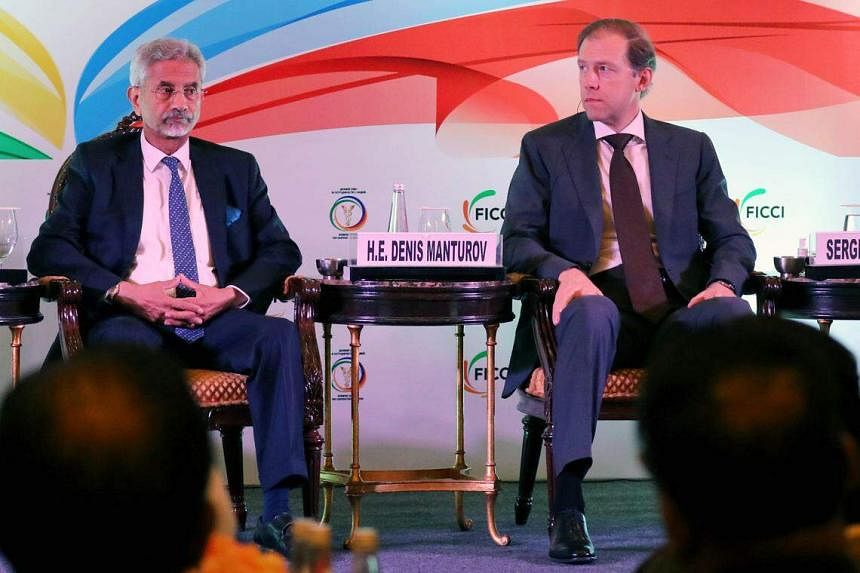NEW DELHI - India and Russia are looking at ways to deepen trade ties, with Moscow viewing the South Asian country as an alternative market for its products in the face of crippling Western sanctions, while New Delhi hopes to reduce a widening trade deficit.
India’s imports from Russia increased five times to US$41.56 billion (S$55.6 billion) between April 2022 and February 2023 compared with the previous corresponding period, mainly due to oil imports, while its exports to the country have hit US$3 billion.
Russia, unable to sell to the West due to sanctions over the Ukraine war, has been selling oil at discounted rates to India and China.
Seeking to boost trade, a 50-member Indian business delegation from the agriculture and food processing sector went to Russia on a four-day visit from April 24 to look for opportunities there.
“We are looking at animal feed, soya bean and ready-to-eat meals,” said Dr Ajay Sahai, director-general and chief executive officer of the Federation of Indian Export Organisations. The delegation spent four days in Moscow and St Petersburg.
Dr Sahai noted that the “huge trade deficit is a concern, but it is also an opportunity to push exports exponentially”. “We have to diversify exports to automobiles and auto components, electronics, medical devices, solar cells, textiles, food and agriculture, etc,” he said.
In spite of its deepening ties with the United States and the West, India has continued to maintain close ties with Russia.
The two countries share deep defence ties, with 60 per cent of Indian weaponry being of Russian origin, necessitating India’s balancing act over the Ukraine war.
At the United Nations, much to the West’s frustration, India has abstained from voting against Russia on many resolutions, but has urged Moscow to seek a peaceful resolution of differences and an end to the war in Ukraine.
Still, foreign policy analysts said, challenges remain in pushing trade amid connectivity issues between the two countries.
The two sides are in discussions to open a maritime corridor between the southern port city of Chennai and Vladivostok, a Pacific port city in Russia.
The route, which has been in the works since 2019, will cut down the transit time for cargo by half to 20 days, in comparison with the current route that goes to Russia’s far east through Europe.
India has also been looking at shipping goods through the International North-South Transport Corridor, a 7,200km network of railroads, highways and maritime routes connecting Russia and Iran to India.
But experts said that will take time, amid gaps in connectivity and the threat of attracting Western sanctions when undertaking any project in Iran.
“It’s not clear whether India-Russia trade, which is quite anaemic, can ride on the back of the current bump provided by the oil situation. An opportunity is certainly there because Russia is sanctioned by the West,” said Mr Manoj Joshi, distinguished fellow at the New Delhi-based Observer Research Foundation.
“But in terms of manufacturing products, India will find it difficult to compete with China. Of course, officially directed trade can be an option, but that has its limits.”
Exports have been going up, but far more modestly than imports. India’s exports to Russia, which include engineering goods, drugs and pharmaceuticals and chemicals, jumped to US$337.58 million in February 2023 from US$280 million in October 2022.
For instance, Russia is already buying more agricultural commodities from India. Between February 2022 and February 2023, coffee exports went up from US$4 million to about US$7 million.
But an arrangement to pay in rupees and roubles has not taken off amid multiple issues, including exchange rate differences. Reports said that this has likely impacted how India will pay for military spares and new equipment from Russia.
Nevertheless, Russia has fresh motivation to deepen trade with India even as dependency on China is growing, said analysts.
“Greater economic and political engagement with India is a big prize for Moscow. Not only may it eventually open a bigger energy market than Europe, but an enhanced relationship can provide a counterbalance to China and help Moscow from sliding into a subservient role with its eastern neighbour,” said Mr Chris Weafer, CEO of Macro-Advisory Limited, an independent strategic business consultancy in the Eurasia region.
China-Russia trade hit a record US$190 billion in 2022, according to the Chinese General Administration of Customs.
Mr Weafer said: “For India, access to discounted Russian oil, coal, and (eventually) gas plus fertilisers and other materials, helps create a more secure supply of critical industrial materials, which will help major parts of the Indian economy become more globally competitive and will increase and diversify exports. It will eventually help create more and better-paid jobs.”


